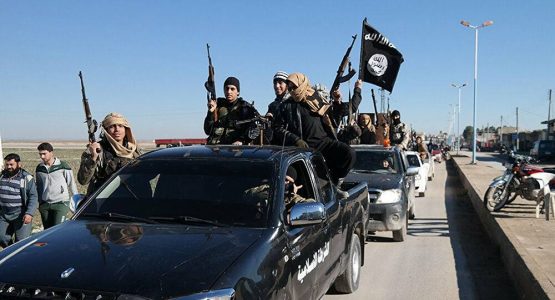
What does the Islamic State want now?
Fifty years ago, John Kerry asked the Senate Foreign Relations Committee a question that is probably occurring to many Americans right now: “How do you ask a man to be the last man to die for a mistake?” Yesterday, at least 13 U.S. service members died in an attack on a crowd of Afghans seeking evacuation from Kabul’s airport.
They died saving their allies from persecution or murder by the Taliban. This was no mistake, although their deaths were the result of a war in which the United States made just about every mistake possible.
It was among the noblest moments of the war, and because it killed them and nearly a hundred Afghans, also one of its most tragic.
The perpetrator was the Islamic State’s local franchise, sometimes called ISIS-K or IS-K, for the group’s Khorasan offshoot in Afghanistan.
Some have also sought to blame the Taliban, who control Kabul and are responsible for the attackers’ getting through the checkpoints that led to the edge of the airport.
The Taliban have bombed crowds in Kabul, and among their members are many who believe that Americans and their collaborators deserve death and more. Even senior U.S. officials confuse these groups: Last week, former Defense Secretary and CIA Director Leon Panetta told NPR he expected the Taliban to “provide a safe haven for al-Qaeda, for ISIS, and for terrorism in general.”
Yet the Taliban claim that 28 of their own soldiers were killed in the blast. And just as we should remember the Taliban’s record, and not credit too easily their claims to have reformed, we should also note just how deeply these groups despise each other—and why ISIS-K has every incentive to blow up Afghans and Americans under the Taliban’s watch.
When the Taliban sacked Kabul this month, they refrained from immediate reprisals against their enemies, with one exception: “The only known execution since the capital’s takeover was of Abu Omar Khorasani, the former head of Islamic State in South Asia,” The Wall Street Journal reports. Khorasani “was taken by the Taliban from an Afghan government prison and killed on the spot.”
Why can’t these jihadis just get along and turn their fire jointly against the United States? The deep reason is ideological. The Taliban’s founder, Mullah Omar, styled himself “Emir of the believers,” a term equivalent in Islam’s classical period to caliph.
Certain rules apply to caliphs, and foremost among them is that there can be only one at a time. Others include the requirement that the caliph be physically whole and descended from the tribe of the Prophet Muhammad. Like most of the original generation of the Taliban, Omar was partially dismembered (missing an eye, in his case), and descended not from an Arab tribe but from a Pashtun clan.
Oh, and another requirement of the caliph is that he must be alive. Omar died in 2013, but the Taliban pulled a Weekend at Bernie’s and lied about it for two years.
The Islamic State, noting these deficiencies, named its own caliph in 2014 when it took control of parts of Syria and Iraq, and relentlessly mocked the Taliban for being apostate hillbillies out of compliance with even the most basic elements of Islam.
One cannot easily forgive or retract insults such as these. Nor can one take back what followed: an all-out military challenge by the Islamic State to the Taliban’s supremacy as Afghanistan’s Islamist guerrilla force.
These two factions fought a war—and even though the Taliban had a decades-long head start, the competition was a close one in certain areas, particularly eastern Afghanistan.
The U.S. intervened to help the Taliban, under the theory that at least the hillbillies were interested only in Afghanistan, whereas the Islamic State would blow up every statehouse and disco on Earth if it had the chance.
When the Taliban took Kabul, ISIS-K paused its operations. Astute observers noted the lull, which looks in retrospect like a period of strategic reassessment, to figure out how to hit both of the Islamic State’s enemies in a single blow.
The Taliban have announced, in word and in action, that their highest priority is maintenance of public order and keeping money and people from fleeing the country.
The American priority is an orderly exit for its citizens and some Afghans to whom the U.S. owes a special debt. The Taliban, for all their faults, seem to have intuited the vulnerability at the airport and tried to keep the crowds around the area small.
But the prospect of their rule is so frightening—and for good reason—that the throngs waiting to be evacuated grew thick around the airport gates anyway, and the Americans could not or would not whisk them away fast enough to keep them from presenting a delicious target.
“It is in the interest of the Taliban that ISIS-K does not metastasize beyond what it is,” President Joe Biden said in his press conference yesterday. These words are exactly right, and in the short term the Taliban are America’s allies in finishing its evacuation.
For an Afghan, though, consider what the bombing portends. When the Soviets withdrew from Afghanistan in 1989, the government they left behind collapsed promptly, and over the next decade, various bickering factions reduced the entire country to rubble.
The prospect of Taliban rule, or even Islamic State rule, is bad enough. Even worse is the promise that Afghanistan’s many factions, some armed and supported from overseas, will resume contesting one another’s dominance by blowing up innocent people.
With a single boom, ISIS-K has ensured that the Americans will leave the country with fresh blood on their uniforms, and has announced to the remaining Afghans that what comes next will be even worse.
Source: The Atlantic





